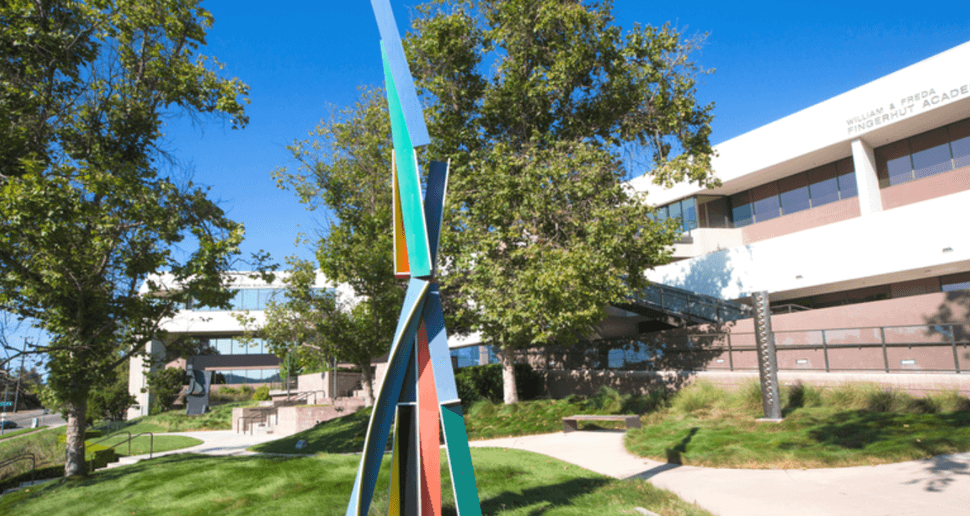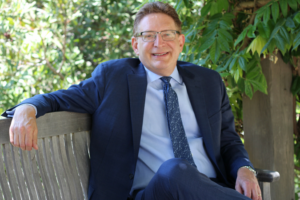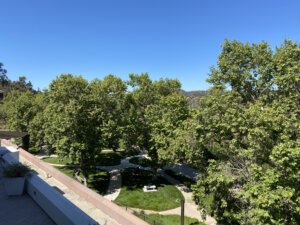AJU sells campus to corporation that beat Jewish school’s final offer
Community mikvah will stay open in the short term; rare Jewish book collection on the move

Graphic by Angelie Zaslavsky
When American Jewish University announced Tuesday it had sold its main campus to an international education company, the bid it accepted beat a lower offer from a Jewish school that had hoped to expand, sources said.
The runner-up was Milken Community School, a private Jewish middle school and high school on the same hilltop as AJU, which bid $60 million, according to three sources who were involved in the bidding process but not authorized to discuss the terms publicly.
The bid accepted by AJU’s board of directors, from EF Education First of Lucerne, Switzerland, was worth around $65 million, the same sources said, qualifying that there were likely other aspects of the offer that might impact its value.
In its heyday the Bel Air property was a crown jewel of the Jewish community. Nestled alongside a trio of other Jewish institutions in the hills between the city and the San Fernando Valley, the campus has for decades housed an elite Conservative seminary, the largest collection of Jewish books west of the Mississippi, and the only non-Orthodox mikvah in the Pacific Southwest.

Reactions were mixed to the sale to a non-Jewish entity. There was consensus in the community that the time had come for AJU to sell, considering the decline of the school as a hub of in-person programming. But the fact that a Jewish school was able to offer a considerable sum for the property — though not enough — seemed bound to disappoint longtime supporters who hoped the site would be revived by another Jewish caretaker.
In an interview with the Forward earlier this year, Milken’s head of school Sarah Shulkind called the listing a generational opportunity for the Jewish community, and said her school was angling to buy it.
Terms of the deal allow AJU offices to remain on campus until September 2028, the school said.
Reached by email Wednesday, AJU President Jeffrey Herbst declined to discuss the financial terms of the agreement.
He said the proceeds of the sale would be placed in the university’s endowment.
“This sale will enable AJU to devote significantly greater resources and focus to our core mission – and to meet the evolving needs of the Jewish community in Los Angeles and beyond, now and in future generations,” Herbst and board chair Harold Masor wrote in a statement emailed to the AJU community Tuesday.
AJU’s choice of a non-Jewish buyer was not entirely a surprise. Not long after American Jewish University put its main campus on the real estate market in February, Herbst said he did not plan to give preference to Jewish bidders — even if one were to match a non-Jewish group’s offer.
“We’ll accept the best qualified offer,” Herbst, 61, said in an interview at the time. “It would be wonderful if that was from the Jewish community.”
End of an era
AJU is one of several institutions in a hub of Jewish culture on the Sepulveda Pass, which links the city’s Westside to the San Fernando Valley. Founded in 1948 as the University of Judaism, the university and its facilities have been integral to LA Jewish community life for decades. Its Brandeis-Bardin campus, a 3,000-acre plot in remote Simi Valley that was not part of the sale, is a popular setting for educational retreats, camps and Shabbatons.
What the private corporation bought is AJU’s Familian campus. In addition to 200,000 square feet of dorms, classrooms and office space, it hosted city-wide Jewish book and food festivals, hundreds of in-person adult learning classes, and high profile public lectures.
But in recent years, the Familian campus has accrued millions of dollars in deferred maintenance as attendance on campus has fallen off. Even before the pandemic hit, declining enrollment prompted Herbst to sunset the undergraduate program in 2018.

And the Ziegler School of Rabbinic Studies, the Conservative rabbinical school on its campus, had only four students in its 2021 first-year cohort. It slashed tuition by 80% in March.
When it was suggested that some might feel the property was irreplaceable to the greater Jewish community, Herbst said in February, “We don’t.”
“Our mission statement says that we promote the Jewish journey of individuals, organizations and community through outreach, teaching and scholarship,” Herbst said at the time. “That’s rock solid. Our mission statement doesn’t say anything about being a landowner in Bel Air.”
It was not Milken’s first attempt to strike a deal to use AJU’s campus, which is located just on the other side of the 405 freeway from the highly rated dual-curriculum school.
In 2019, when AJU announced it was exploring “strategic partnerships” for use of the campus, Milken entered talks to lease a part of it, but Shulkind said they never advanced to the point of an offer.
With an enrollment of about 770 students, Shulkind said in March that the school has had to turn more away because it can’t fit them on its property.
“Obviously, that’s not the AJU’s problem,” Shulkind said then.
Lost treasure
News of the buyer confirmed the fears of families whose donations had helped fund the institution.
Responding to initial reports of the listing, Sondra Smalley, whose parents, Isadore and Sunny Familian, helped found the university with a major gift and raised millions of dollars to acquire the campus, called it “a gut punch.”
“I know the name will change, my parents’ name will come off,” Smalley told the Forward in February. “I understand that. And it will be named after whoever gets it. But I hope it stays within the Jewish community.”
Other LA residents were concerned about the fate of the community mikvah, where hundreds of Jewish converts have completed their journey into the faith since its inception in 1981, and which is still visited by more than a thousand people per year.
Herbst, who in 2017 resigned as president and CEO of the Newseum amid financial troubles at the institution, said in an email that the mikvah would continue to operate at the Familian campus in the short term.
“We recognize the importance of the non-denominational mikvah to the community,” he wrote. “AJU will be coordinating a community-wide discussion on establishing a non-denominational community mikvah to replace AJU’s mikvah in the future.”
The library and rare book collection would be relocated, he wrote, adding that the school “has no plans to sell any of the collection.”
EF Education First was founded in Sweden in 1965 as a French language course for Swedish students. The company expanded into the U.S. in 1983, and today is headquartered in Switzerland.
Herbst’s email to the AJU community described the campus’ new owner as “a family-owned international educational organization that helps people become global citizens through language learning and international academic degree programs,” and as a company with a reputation for being a good neighbor.
“EF looks forward to introducing itself to the local community and they will be hosting a community open house and information session in the weeks ahead,” he wrote.
Herbst has been AJU’s president since 2018. He was previously the president and chief executive of the Newseum, a journalism museum in Washington. He resigned abruptly in 2017 with the museum facing financial troubles. The Newseum closed in 2019.






















